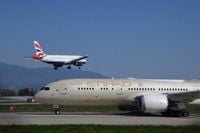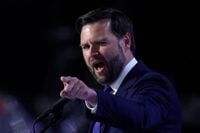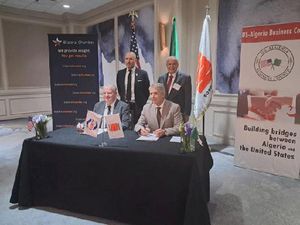In a recent interview, Vice President JD Vance addressed the complex dynamics of U.S.-Europe relations, emphasizing the need for European nations to cultivate a more independent stance on the global stage. This conversation comes on the heels of significant turmoil in financial markets, largely attributed to President Trump’s controversial "Liberation Day" tariffs imposed on European allies. Vance's remarks, delivered during his first major engagement with a European outlet since taking office, reflect a broader discontent regarding the state of transatlantic ties.
Vance articulated a vision where Europe must take greater responsibility in addressing pressing issues such as immigration and security. He stated, "It’s not good for Europe to be the permanent security vassal of the United States," underscoring his belief that European leaders need to respond more effectively to their constituents' demands. He further remarked, "We’re very frustrated that European populations keep on crying out for more sensible economic and migration policies, and the leaders of Europe keep on offering the opposite of what they seem to have voted for." This criticism highlights a disconnect between European politicians and the electorate, particularly regarding immigration policies.
In the context of the ongoing conflict in Ukraine, Vance condemned Russia’s actions since 2022, while also suggesting that understanding both sides' strategic objectives is crucial to resolving the crisis. He stated, "I think it’s sort of absurd for Zelensky to tell the American government that we are somehow on the side of the Russians," emphasizing the importance of recognizing the complexities at play.
Vance's perspective on European security is equally pointed. He noted, "The reality is — it’s blunt to say it, but it’s also true — that Europe’s entire security infrastructure, for my entire life, has been subsidized by the United States of America." This assertion reflects a long-standing dependency that Vance believes must change for Europe to assert itself as a formidable global player.
Moreover, he expressed that a strong, independent Europe could serve as a necessary check on American foreign policy. Vance remarked, "I don’t want the Europeans to just do whatever the Americans tell them to do. I don’t think it’s in their interest, and I don’t think it’s in our interests, either." This call for autonomy resonates with historical sentiments expressed by figures like Charles de Gaulle, who advocated for European independence during the Cold War.
Looking specifically at the United Kingdom, Vance mentioned the administration's efforts to negotiate a trade deal with Keir Starmer’s government, emphasizing the strong cultural and economic ties between the two nations. He noted, "The President really loves the United Kingdom. He loved the Queen. He admires and loves the King." The focus on establishing fair trade relationships reflects a broader strategy of rebalancing economic interactions with Europe, particularly in light of the tariffs that have caused considerable disruption.
In a related development, a recent survey of 1,350 small and medium-sized enterprises (SMEs) in Switzerland revealed that 95% do not plan to relocate to the U.S. as a result of the tariffs. Only 65 SMEs indicated they were considering such a move, highlighting the complexities of international trade dynamics in the wake of U.S. policy shifts. The U.S. remains a significant export market for many of these companies, accounting for up to a quarter of their turnover. However, the association representing these businesses cautioned that relocating production would be too complicated for most, given their existing supply chain structures.
As the global tourism sector grapples with the repercussions of the Trump administration’s policies, airlines are feeling the pressure. Major carriers, including British Airways, Delta Air Lines, and United Airlines, have begun slashing ticket prices and shelving planned route expansions for the latter half of 2025. This strategic retreat is aimed at maintaining demand from key European markets, where travelers are increasingly hesitant to visit the U.S. due to political tensions and stricter immigration controls.
British Airways has responded by offering aggressively priced round-trip deals to New York from several European cities, with fares dropping below £400. This pricing strategy marks a significant shift as airlines attempt to entice travelers amidst a backdrop of declining tourist arrivals. According to the U.S. International Trade Administration, European travel to the United States plummeted by 17% in March 2025 compared to the previous year, with Denmark experiencing a staggering 33% drop in visitors.
Tourism analysts now predict a 9% decline in EU arrivals for the full year 2025, a stark contrast to earlier forecasts that had anticipated growth. This downturn is attributed not only to economic factors but also to a growing sense of alienation among European travelers, exacerbated by the Trump administration’s rhetoric and policies.
The complex interplay of tariffs, immigration policies, and political sentiment is reshaping the travel landscape, as evidenced by the contrasting perspectives within the UK travel sector. While some travel agencies report an increase in bookings, the overall sentiment remains cautious, with many travelers opting for alternative destinations that project safety and inclusivity.
As the Trump administration continues to navigate its foreign policy and trade strategies, the implications for U.S.-Europe relations remain profound. Vance’s call for a more independent Europe, coupled with the growing discontent among European populations regarding immigration and security, signals a pivotal moment in transatlantic relations. The future of these ties will likely depend on how both sides adapt to the evolving political landscape and address the concerns of their constituents.






